Ceremony to receive the certificate of national historical relic of Ho Hung Dat temple
(Baonghean.vn) - On March 1, in Ngoc Son commune, Quynh Luu district, the Ho Family Liaison Committee of Vietnam solemnly held a ceremony to receive the certificate of national historical relic for the Ho Family Ancestor Temple - Ho Hung Dat (Ho King Temple).
Attending the ceremony were representatives of the Ministry of Culture, Sports and Tourism, the Provincial Party Committee's Mass Mobilization Committee, the Department of Culture, Sports and Tourism, the Department of Information and Communications, the Ho Family Liaison Committee of Vietnam, representatives of the Ho Family Liaison Committees of 42 provinces and cities across the country, representatives of the leaders of Quynh Luu district, Ngoc Son commune and many descendants of the Ho family across the country.
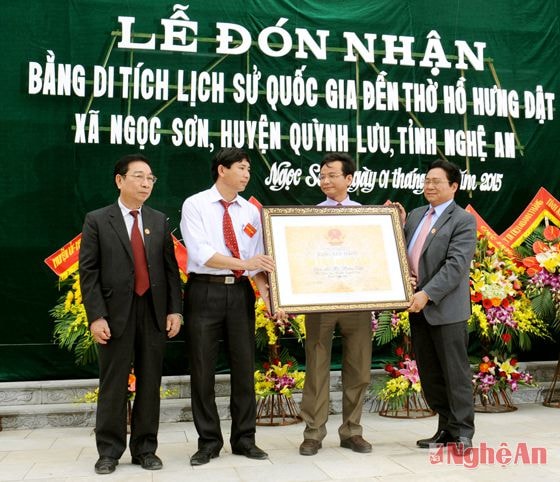 |
| Awarding the National Historical Relic Certificate to the Temple of Ho Family Ancestors |
Ho Hung Dat Temple (also known as King Ho Temple) is the place to worship the founder of the Ho family in Vietnam, the first laureate Ho Hung Dat and his descendants, including typical figures in the country's history: King Ho Quy Ly, King Ho Han Thuong, Nguyen Nhac, Ho Thom, Nguyen Quang Toan, Princess Bach Y, Queen of Nom poetry Ho Xuan Huong...
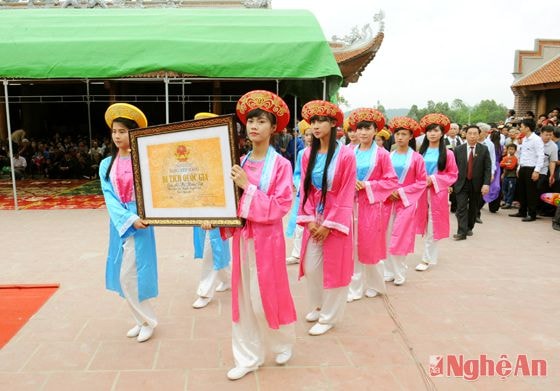 |
| Ceremony of receiving the Certificate of National Historical Relic of King Ho Temple |
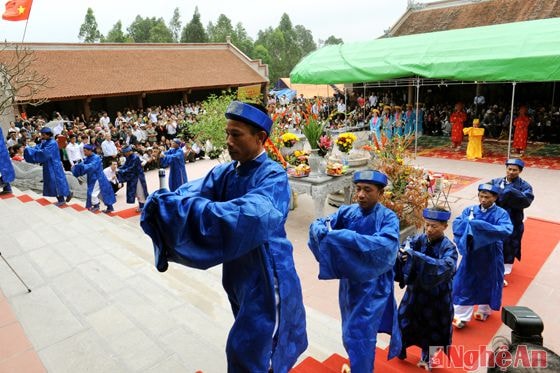 |
| Ho family ancestor worship ceremony |
The first-ranking scholar Ho Hung Dat was born around the beginning of the 10th century, in Vu Lam, Zhejiang province (China). He passed the imperial examination under the Han Dynasty Emperor An De, and came to Vietnam to serve as the governor of Chau Dien region during the Later Han Five Years period (around 948-950). When the 12 warlords rebellion broke out (966)..., Ho Hung Dat discussed with Dinh Bo Linh to raise troops to quell the rebellion. With the wish of "Van dynasties for the people", Ho Hung Dat resigned from office, went to Huong Bao Dot to build a house, make a living and become the founder of the Ho family in Chau Dien at that time, which was called Bao Dot, a desolate land. With a far-sighted vision, Ho Hung Dat decided to choose Huong Bao Dot as the main farm to reclaim land and make a living.
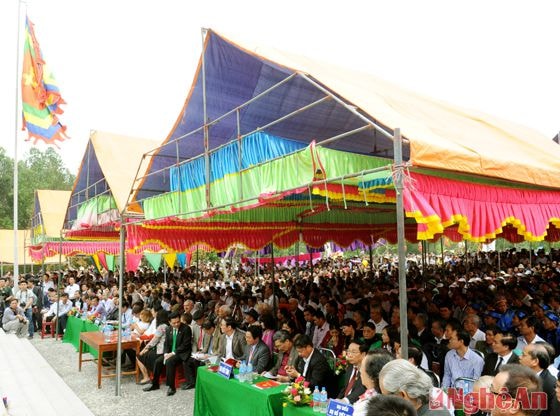 |
| Delegates attending the ceremony |
The early days were extremely difficult, but with his will and determination, Ho Hung Dat gathered like-minded people, joined forces, shared food and clothes, reclaimed and restored the land, and soon turned the wild land into a prosperous Bao Dot village.
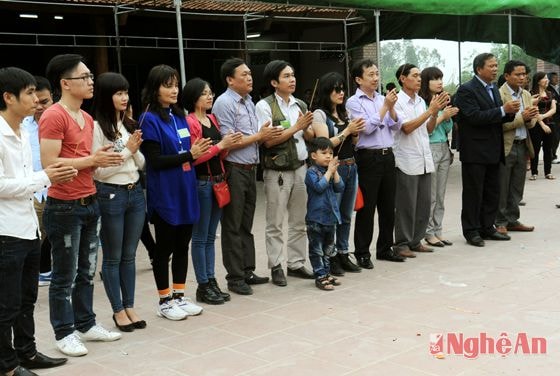 |
| Ho descendants offer incense in the ancestor worship ceremony |
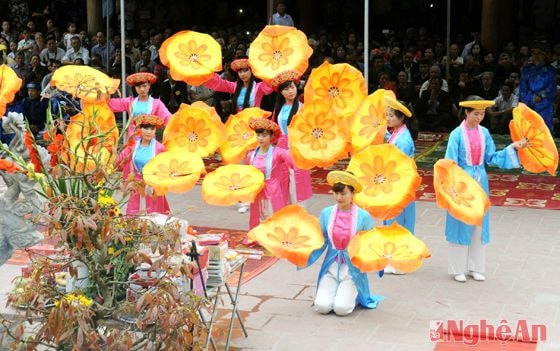 |
| Lotus dance in the Ho family's ancestral worship ceremony |
The first-ranking scholar Ho Hung Dat, the founder of the Ho family in Vietnam, was a man of high virtue and talent, full of humanity, who lived his whole life for the people. When he was a mandarin, with his talent and intelligence, he devoted himself to his homeland and country. When he settled down in Bao Dot, he devoted a lot of effort and intelligence to reclaiming wasteland, restoring it, building dams, digging canals, creating a fertile land, and building prosperous villages and hamlets. His merits and name left a strong emotional mark in the hearts of the people from generation to generation. After his death, the people of Dien Chau, Yen Thanh, and Quynh Luu built a temple to worship him and honored him as the village's tutelary god, and set up an altar to worship him. In the year of Quy Mui (1403), King Ho Han Thuong built a temple to worship him on the land he reclaimed and established.
After many historical ups and downs, the temple became a ruin. In response to the wishes of the local people and the descendants of the Ho family in Vietnam, in 2011 the Ho family Liaison Committee organized the restoration of the Ho Hung Dat ancestor temple right on the old temple's foundation. With a complete scale including the main hall, the front hall, the left wing, the right wing, the stele house, the fence surrounding the campus with a total area of over 12 hectares. The total funding contributed by the Ho family to build phase 1 was over 23 billion VND.
After the ceremony to receive the certificate of national historical relic, the Ho Family Liaison Committee of Vietnam held a grand ceremony to worship the ancestors according to the traditional rituals of the family and organized the 4th Ho Family Congress of Vietnam.
Sy Minh






